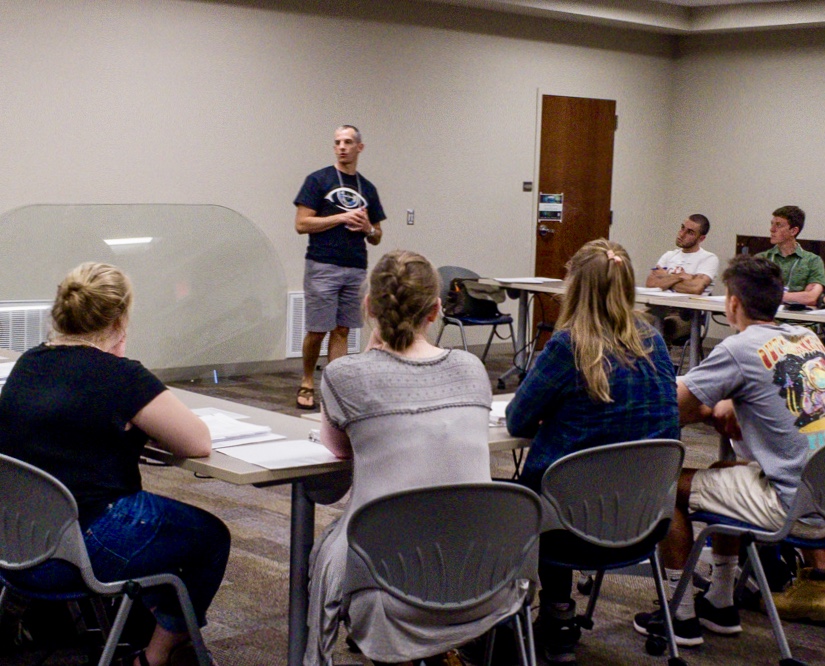Anti-harassment/discrimination training materials
 Are the students in your research program vulnerable to harassment or discrimination?
Are the students in your research program vulnerable to harassment or discrimination?
In support of the geoscience community’s attentiveness to developing a more inclusive culture that is resistant to harassment and discrimination, a collaborative effort to develop an anti-harassment/discrimination curriculum is underway. The curriculum is designed to be engaging and educative for undergraduate students, who may have little formal training in the terminology and concepts surrounding such topics, are likely to be unaware of policies and procedures regarding harassment, discrimination, and fraternization, are unlikely to know how to respond if they were to witness an incident of discrimination or harassment, and unlikely to know how to report incidents. Through this curriculum we seek to empower students, who might otherwise be vulnerable.
We also designed this curriculum to be a practical and approachable resource to inspire, encourage, and enable program facilitators, faculty, and other community leaders to engage with their students around these important topics to change our community’s culture.
Audience:
Undergraduate students participating in science, technology, engineering, or math summer research opportunities, or participating in short duration field campaigns such as geoscience field camps, etc.
Total Time = ~120 minutes
- Session 1 - ~75 minutes
- Session 2 - 30 to 60 minutes
Learning Objectives:
Following instruction, participants will be able to:
- Describe a work environment that
- consists of mutual respect,
- promotes respectful and congenial relationships, and
- is free from all forms of harassment and discrimination
- Summarize who is responsible for creating the work environment described above
- Distinguish between behavior that is harassing or discriminating and non-harassing or non- discriminating
- Describe how to report harassment or discrimination to the program, the program’s investigation procedures, and possible disciplinary outcomes
- Plan how they would use the bystander interventions to respond to incidents of discrimination or harassment, including sexual harassment
- Apply the program’s anti-harassment, anti-discrimination, and non-fraternization policy to a series of case studies
Full Curriculum (Revised May, 2021)
IRIS's Internship Program Handbook (Version 1.5) - Last Update: May 20121
Sample slides from a virtual version of the training faciliatated on June 10, 2020
Are you running this curriculum virtually?
If so, check out the sample virtual modifications (.docx file) have documented from various users. These may be helpful in considering how to adapt the curriculum to fit your needs.
Use and Feedback Encouraged! This curriculum is intended to be a community resource. Therefore feedback, input, and the development of new supplemental modules from others are strongly encouraged! To coordinate versions, please send contributions and feedback to Michael Hubenthal at hubenth@iris.edu and we'd love to add you to the contributor list!
Project Status:
- Summer 2021
- "Train the Trainers" webinar about the curriculum delivered to the GEO-REU community on April 15, 2021.
- Slides from "Train-the-Trainer" webinar
- Recording from the "Train-the-Trainer" webinar (at right)
- Light revisions and new layout - May 21, 2021
- "Train the Trainers" webinar about the curriculum delivered to the GEO-REU community on April 15, 2021.
- Summer 2020
- Light revisions expected in early 2020.
- Sample modifications (.docx file) for virtual implimentation provided by curriculum users.
- Formal data collection during the summer 2020 has been suspended due to the cancellation of nearly all face-to-face internship programs. However, we do encourage REU sites to experiment with the curriculum in a virtual environment and consider informal data collection (it won't be used as an official part of the study).
- Hubenthal, M., Ladue, D., Snow, M. (2020). Interactive Anti-Harassment/Discrimination Curriculum for REU Programs: Results from Pilots and Expert Reviews. presented at the 2020 Earth Educators' Rendezvous 13-17, July.
- "Train the Trainers" webinar about the curriculum delivered to the GEO-REU community on May 21st, 2020.
- Summer 2019 - Beta version development and formal evaluation piloted at two REU sites. Results from the 2019 evaluation were presented at the 2019 Fall AGU meeting. Hubenthal, M., Ladue, D., Snow, M. (2019), Results from Pilot of Anti-Harassment/Discrimination Curriculum Suggests It Hits Home with Undergraduate Geoscience Students, Abstract ED33F-1041 presented at 2019 Fall Meeting, AGU, San Francisco, CA, 9-13 Dec.
- Summer 2018 - Initial development of Alpha version. Piloted at two REU sites with informal data collected.
Contributors*:
Michael Hubenthal - IRIS Consortium (hubenth@iris.edu)
Daphne LaDue - University of Oklahoma
Martin Snow - University of Colorado, Boulder
*We are grateful for the pilot participants and external expert reviewers. All of their feedback has significantly improved of the curriculum.
Acknowledgments:
This material is based upon work supported by NSF under Grant Nos. EAR-1852339, AGS-1560419, & AGS-1659878, and SAGE, which is a major facility operated by the IRIS Consortium and funded by NSF under award EAR-1851048 and earlier NSF awards.


